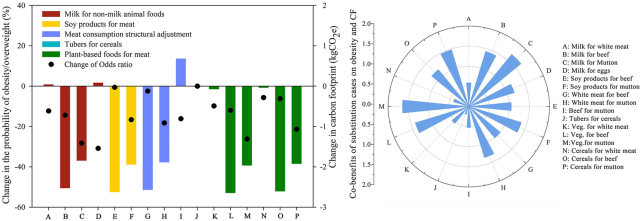| Location: Home > Papers |
| First Author: | WANG Lan |
| Abstract: |
Dietary adjustment through food group substitutions is an adaptive strategy for obesity management in human populations and action on climate change. However, specific dietary adjustment scenarios (DASs) are underexplored in the current research. This study applied logistic regression to establish an association between the probability of obesity/overweight (O/O) and eleven food groups. The findings suggest that consumption of greater amounts of vegetables (odds ratios (OR) = 0.964) and milk (OR = 0.946) is associated with a less likelihood of O/O, while greater amounts of eggs (OR = 1.367), white meat (OR = 1.078), cereal (OR = 1.037), beef (OR = 1.105), and mutton (OR = 1.317) is associated with a greater likelihood of O/O. With a 100 g replacement, the scenario of substituting milk for eggs is related to a 31% reduction in the probability of O/O (PO); substituting vegetables for beef would produce a 2.65 kg CO2e reduction in individual CF per year; substituting milk for mutton is related to the highest co-benefits with PO and CF reduced by 28% and 1.85 kg CO2e per year, respectively. Moreover, making a 50 g replacement, the scenario of substitution of red meat with milk, soy products, and white meat produces a 9.1 Mt, 6.5 Mt, and 3.4 Mt CO2e annual CF reduction in China under an assumption that half of the population adopt the dietary substitution twice a week. Similarly, the scenario of substituting cereals with tubers would cut the national CF by 0.3 Mt CO2e per year. On nutritional effects, almost DASs produce slight disturbance on protein, fat, and calorie and the change ratio is within 5%. Dietary adjustment measures focus on increasing plant-based food consumption, re-orienting the mix of meat products consumption (via substituting red meat with white meat and introducing meat alternatives, especially soy products), publicizing the benefits of dietary adjustment to consumers, and emphasizing the changes in nutrition, especially in situations of substitution of animal-based foods with plant-based foods, but the influence on protein and fat deserves attention.
|
| Contact the author: | CUI Shenghui |
| Page Number: | 125675 |
| Issue: | |
| Subject: | |
| Impact Factor: | |
| Authors units: | |
| PubYear: | MAR 20 2021 |
| Volume: | 289 |
| Publication Name: | JOURNAL OF CLEANER PRODUCTION |
| The full text link: | https://doi.org/10.1016/j.jclepro.2020.125675 |
| ISSN: | |
| Appendix: |
